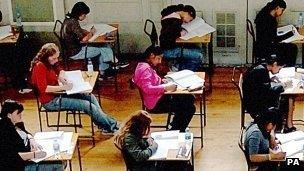A-levels 'could become university entrance exams'
- Published

Exam boards currently set A-levels
Giving academics too much influence over A-levels could turn them into university entrance exams, says private schools leader John Wood.
The chairman of the Independent Schools Association warned that schools may feel forced to choose A-level courses because of links between exam boards and universities.
The government wants universities to have more of a say in setting A-levels.
But Mr Wood says schools should be involved.
Speaking at the Association's conference in Harrogate, Mr Wood urged the government to re-consider its decision to ask universities to drive the setting of exam syllabuses.
'Key role'
He said: "It is absolutely right that syllabus development and the oversight of A-levels should not be the preserve of the exam boards alone.
"But we must ensure that universities are not given too much influence over the actual content of exams.
"As competition for university places increases, there is a real risk that schools will feel forced to select certain exam boards, based on their links with higher education institutions."
Education Secretary Michael Gove has suggested elite universities should be given a key role alongside exam boards in setting and approving A-levels.
And he has asked the exams regulator, Ofqual, to oversee a process of reform.
In a letter to Ofqual last month, Mr Gove said: "I will expect the bar to be a high one: university ownership of the exams must be real and committed, not a tick-box exercise.
"I do not envisage the Department for Education having a role in the development of A-level qualifications.
"It is more important that universities are satisfied that A-levels enable young people to start their undergraduate degrees having gained the right knowledge and skills, than that ministers are able to influence content or methods of assessment."
Narrower?
But Mr Wood warned there was a danger that greater university input could make exams already considered to be narrow even worse.
He said: "There is also a danger that A-levels will become so narrow that students won't possess the independent learning skills that successful undergraduates need."
He added that the current system did not reward students who read widely around the subjects they are studying.
This was partly because certain textbooks were targeted directly at examinations, he said.
Mr Wood added: "I would like to see a partnership between universities, those in schools and colleges and also employers' representatives, who would work with the awarding bodies to ensure that A-levels provide the best possible preparation for young people's future study or employment."
A Department for Education spokesman said: "Leading academics in our best universities have been clear that there are some serious problems with A-levels and they are not preparing pupils properly for rigorous degrees.
"The Department for Education is withdrawing from involvement in A-levels and improving them is now a matter primarily for good universities and exam boards."